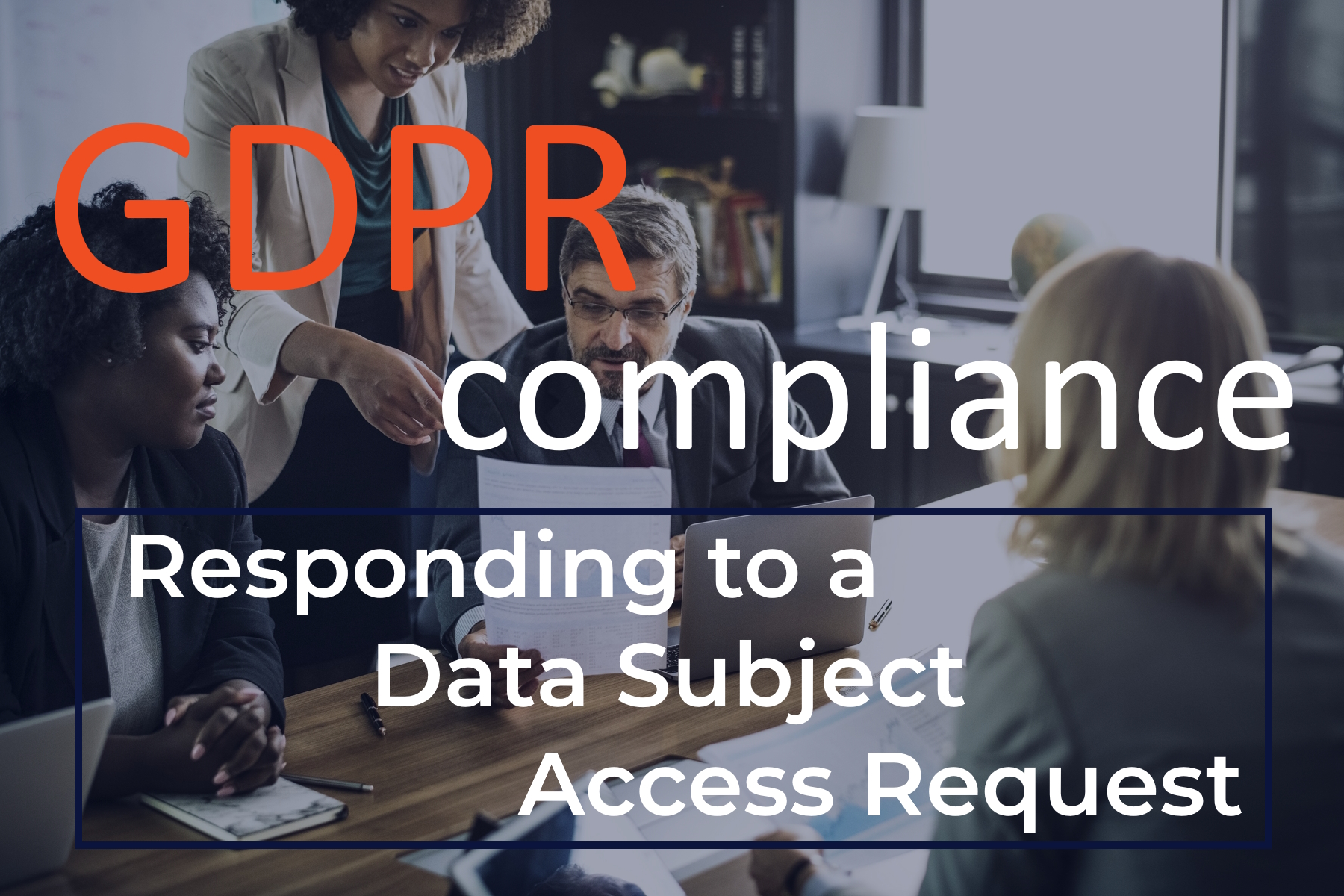Responding to a Data Subject Access Request
Introduction
As data protection laws continue to evolve and gain prominence worldwide, businesses of all sizes must take steps to comply with regulations such as the General Data Protection Regulation (GDPR) and other data protection laws. One such requirement is responding to Data Subject Access Requests (DSARs), which allow individuals to request access to their personal data that is being processed by a business.
This article serves as a comprehensive guide to help businesses understand their legal obligations in responding to DSARs and how to effectively manage and respond to such requests. Whether you are a small business owner or a compliance professional, this guide will provide you with the necessary knowledge and tools to navigate the complex world of DSARs.
In this guide, we will explore the legal framework for DSARs, including GDPR and other data protection laws, as well as the requirements for responding to DSARs. We will also delve into the key steps businesses need to take in preparing for and responding to DSARs, including developing policies and procedures, identifying and locating personal data, and ensuring the security of personal data.
Finally, we will address some common questions about DSARs and provide practical tips and advice to help businesses effectively respond to these requests. By the end of this guide, you will have a comprehensive understanding of how to manage and respond to DSARs, which will help your business comply with data protection laws and protect the privacy rights of your customers and employees.
Understanding the Legal Framework for DSARs
Data subject access requests (DSARs) are becoming increasingly common as individuals seek greater control over their personal data. As such, businesses must have a clear understanding of the legal framework for DSARs to ensure compliance with the relevant data protection laws.
Under the General Data Protection Regulation (GDPR), individuals have the right to access their personal data held by a business. This means that they can request information about what data is being processed, why it is being processed, and who it is being shared with.
The GDPR also sets out specific requirements for businesses when responding to DSARs. For example, businesses must verify the identity of the requestor before providing access to personal data. They must also provide the requested information within one month of receiving the request, although this timeframe may be extended by an additional two months in certain circumstances.
Additionally, businesses must redact or withhold any personal data that relates to other individuals. This means that they must ensure that they do not disclose information that would breach the privacy rights of other individuals.
It is important to note that non-compliance with DSARs can result in significant penalties and fines by regulatory authorities. Therefore, businesses must take these requests seriously and ensure that they have the necessary resources and expertise to respond to them promptly and accurately.
Overall, understanding the legal framework for DSARs is essential for businesses to ensure compliance with data protection laws and build trust with their customers. By taking a proactive approach to DSARs and implementing effective data protection compliance measures, businesses can protect their reputation and avoid potential legal consequences.
TIP: get your free copy of the GDPR in a handy and easy to navigate format!
Preparing to Respond to DSARs
Responding to a data subject access request (DSAR) can be a time-consuming and complex process, especially for organizations that handle large volumes of personal data. However, by being well-prepared and having the necessary procedures in place, businesses can respond to DSARs promptly and accurately.
The first step in preparing to respond to DSARs is to establish a clear process for receiving and handling these requests. This includes identifying a designated point of contact within the organization and ensuring that all staff members are aware of their responsibilities when it comes to responding to DSARs.
It is also important for businesses to have systems in place to verify the identity of the requestor. This helps to prevent unauthorized access to personal data and ensures that the business is complying with its legal obligations under data protection laws.
Organizations must also have a system for managing and storing personal data. This includes having clear policies and procedures for the retention and deletion of personal data, as well as robust security measures to protect against data breaches.
In addition, businesses must be able to redact or withhold any personal data that relates to other individuals. This requires a thorough understanding of the scope of the DSAR and the ability to identify and redact any personal data that is not relevant to the request.
Finally, organizations must ensure that they have the necessary resources and expertise to respond to DSARs promptly and accurately. This may involve training staff members on data protection laws and procedures or outsourcing the process to a third-party provider.
How to Respond to a DSAR
Once a business has received a data subject access request (DSAR), they must respond promptly and accurately to ensure compliance with data protection laws. Responding to a DSAR requires careful planning and execution to ensure that all relevant personal data is identified, extracted, and provided to the requestor in a secure manner.
The first step in responding to a DSAR is to verify the identity of the requestor. This is crucial to prevent unauthorized access to personal data and ensure compliance with data protection laws. Businesses must also ensure that the request is valid and falls within the scope of the requestor's rights under applicable data protection laws.
Once the request has been validated, organizations must identify and extract all relevant personal data. This includes personal data that may be stored across different systems and departments within the organization. Businesses must also be able to redact or withhold any personal data that is not relevant to the request, such as information that relates to other individuals.
After identifying and extracting all relevant personal data, businesses must provide the requestor with a copy of their personal data in a structured, commonly used, and machine-readable format. The requestor must also be provided with information about the processing of their personal data, including the purposes of the processing, the recipients of the data, and the retention period.
Organizations must also ensure that the personal data is provided securely to the requestor. This includes implementing appropriate security measures to protect against unauthorized access, disclosure, or loss of personal data during transmission.
Finally, businesses must ensure that they respond to DSARs within the prescribed time frame under applicable data protection laws. This time frame can vary depending on the jurisdiction and the complexity of the request, but businesses must respond promptly to avoid potential legal consequences. Under the GDPR, organizations must respond to DSARs without undue delay and at the latest within one month of receipt of the request. If the request is complex or numerous, organizations may extend the response time by an additional two months. However, organizations must inform the requestor of any such extension and provide an explanation for the delay.
Overall, responding to a DSAR requires careful planning, execution, and compliance with data protection laws. By following the appropriate procedures and providing the requestor with their personal data in a secure and timely manner, organizations can protect their reputation and avoid potential legal consequences.
Frequently Asked Questions about Responding to DSARs
Now, as a business owner or employee dealing with Data Subject Access Requests, you might have some questions on how to handle them. Here is a list of the most common questions that can help you to understand the concept.
What is a data subject access request (DSAR)?
A DSAR is a request made by an individual to a business for access to their personal data held by that business.
Who can make a DSAR?
Any individual whose personal data is held by a business can make a DSAR.
Who should respond to a DSAR?
The business that holds the individual's personal data should respond to a DSAR.
How do I respond to a GDPR data access request?
To respond to a GDPR data access request, businesses should verify the identity of the requestor, provide access to personal data, and redact or withhold personal data that relates to other individuals.
How quickly do I need to respond to a DSAR?
Businesses must respond to DSARs within one month of receiving the request. This timeframe may be extended by an additional two months in certain circumstances.
Can I charge a fee for responding to a DSAR?
Businesses may charge a reasonable fee for responding to a DSAR in certain circumstances. This includes where the request is manifestly unfounded or excessive, or where the request is repetitive.
Can I refuse a DSAR?
Businesses may refuse a DSAR in certain circumstances. This includes where the request is manifestly unfounded or excessive, or where the request relates to legal proceedings.
What should I do if I receive a complex or large DSAR?
If a business receives a complex or large DSAR, they should communicate with the requestor and agree on a reasonable timeframe for responding to the request.
Do I need to comply with GDPR when responding to DSARs from individuals located outside of the EU?
If a business holds personal data of individuals located outside of the EU, they must comply with GDPR when responding to DSARs from those individuals.
How long do I need to keep records of DSARs?
Businesses must keep records of DSARs and their responses for a specified period. The length of time may vary depending on local regulations.
What are the penalties for non-compliance with DSARs?
Businesses that fail to comply with the legal requirements of DSARs may be subject to penalties and fines by regulatory authorities.
Where can I learn more about Data Subject Rights and Data Subject Access Requests?
22Academy provides a comprehensive Focus Course on Data Subject Rights. This course is targeted at those that are preparing for the CIPP/E Exam, but need to brush up on specific knowledge about Data Subject Rights under the GDPR.
Conclusion
In conclusion, responding to a data subject access request (DSAR) is a crucial aspect of data protection compliance. Businesses must understand their legal obligations under the relevant data protection laws, including GDPR, and be prepared to respond to DSARs within the specified timeframe.
To respond to DSARs effectively, businesses must have proper procedures in place for receiving, verifying, and responding to requests. They must also ensure that they redact or withhold any personal data that relates to other individuals.
Failure to comply with the legal requirements of DSARs may result in significant penalties and fines by regulatory authorities. Therefore, it is essential for businesses to take DSARs seriously and ensure that they have the necessary resources and expertise to respond to these requests promptly and accurately.
Overall, by taking a proactive approach to DSARs and implementing effective data protection compliance measures, businesses can build trust with their customers and protect their reputation in the marketplace.



